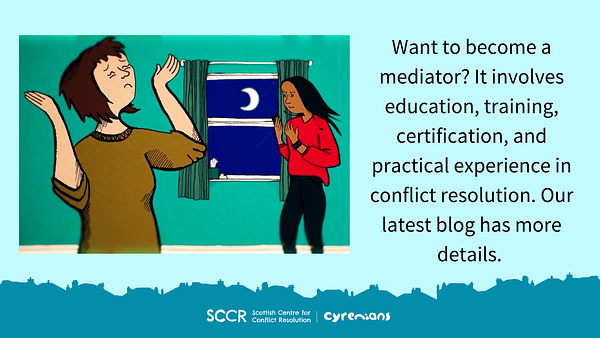How to become a mediator in Scotland
Education, training, certification, and practical experience in conflict resolution - just some of the qualities you'll need if you want to become a mediator. Our latest blog has more detail.

Aspiring to become a mediator in Scotland in 2023 involves a structured process that encompasses education, training, certification, and practical experience in conflict resolution.
While no specific educational prerequisites exist for mediators in Scotland, a background in law, social sciences, psychology, or related fields is advantageous. Prospective mediators typically pursue mediation training courses offered by reputable institutions or organizations. These courses are comprehensive, covering areas such as conflict resolution methodologies, communication techniques, and the legal framework underlying mediation practices.
Certification is pivotal in validating the competence and proficiency of a mediator. Accreditation bodies like the Scottish Mediation Network (SMN) or the Law Society of Scotland oversee certification programs. Acquiring certification signifies an adept understanding of mediation principles and the capability to apply them professionally.
Perhaps, then, this is the moment to mention that the SCCR is soon to run its own Mediator and Mediation Training Skills course. Kicking off on Monday, 8 January, the four-week Mediator and Mediation Skills Training course is a training program that not only equips you with the latest in mediation theory and practice but also offers a supportive environment for honing your skills. Email sccr@cyrenians.scot for more information or read this blog.
Gaining practical experience is important. Volunteering, internships, or apprenticeships within mediation organizations provide invaluable hands-on exposure. Observing experienced mediators in action and actively engaging in supervised cases significantly contributes to skill enhancement.
Building a professional network is instrumental. Participation in seminars, workshops, and industry-specific gatherings fosters connections within the mediation community. Membership in associations like SMN facilitates staying abreast of industry developments, access to resources, and networking opportunities.
Establishing a mediation practice requires planning. Specialization in areas such as family mediation, workplace disputes, or community conflicts demands careful consideration. Cultivating a reputable standing in the field and developing a clientele necessitates dedication and perseverance.
Understanding the legal framework surrounding mediation in Scotland is fundamental. Familiarity with pertinent laws and regulations ensures adherence to legal standards and enhances the mediator's effectiveness in managing cases.
Continuous learning is integral to a mediator's professional growth. Remaining updated with industry advancements, participating in advanced workshops, and pursuing ongoing education are vital for refining skills and staying current within the field.
If that doesn’t put you off, that’s great, because the world needs more mediators, now more than ever. The path to becoming a mediator involves a multifaceted approach encompassing education, certification, practical experience, and ongoing professional development. It requires dedication, a strong ethical compass, and a genuine commitment to assisting individuals in resolving conflicts amicably. Embracing this vocation can lead to a rewarding career dedicated to facilitating peaceful resolutions in diverse spheres of society. Good luck!





